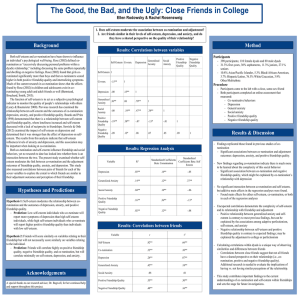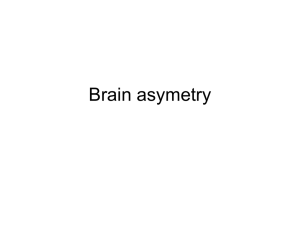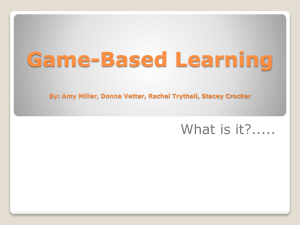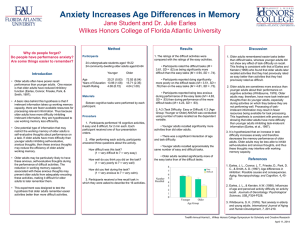Age Differences in Rumination, Co
advertisement
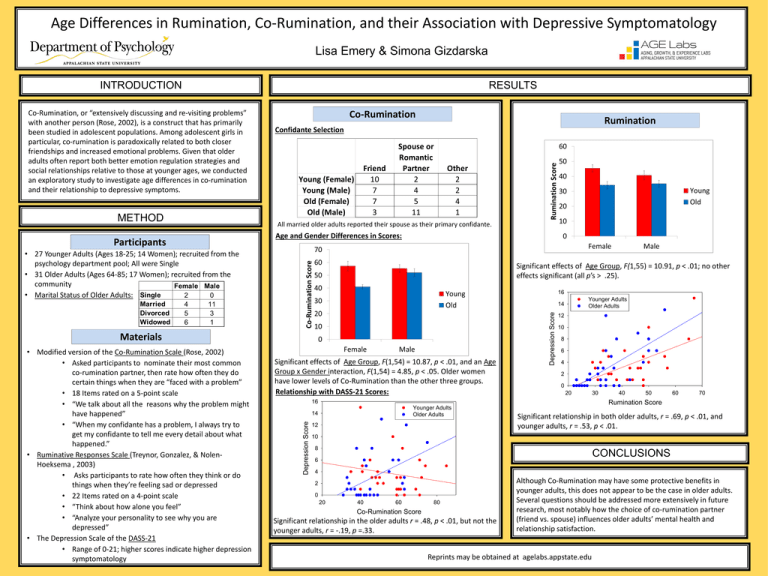
Age Differences in Rumination, Co-Rumination, and their Association with Depressive Symptomatology Lisa Emery & Simona Gizdarska INTRODUCTION RESULTS Co-Rumination, or “extensively discussing and re-visiting problems” with another person (Rose, 2002), is a construct that has primarily been studied in adolescent populations. Among adolescent girls in particular, co-rumination is paradoxically related to both closer friendships and increased emotional problems. Given that older adults often report both better emotion regulation strategies and social relationships relative to those at younger ages, we conducted an exploratory study to investigate age differences in co-rumination and their relationship to depressive symptoms. METHOD Co-Rumination Rumination Confidante Selection Young (Female) Young (Male) Old (Female) Old (Male) Friend 10 7 7 3 Spouse or Romantic Partner 2 4 5 11 Other 2 2 4 1 All married older adults reported their spouse as their primary confidante. Age and Gender Differences in Scores: • 27 Younger Adults (Ages 18-25; 14 Women); recruited from the psychology department pool; All were Single • 31 Older Adults (Ages 64-85; 17 Women); recruited from the community Female Male • Marital Status of Older Adults: Single 2 0 Married Divorced Widowed 4 5 6 Significant effects of Age Group, F(1,55) = 10.91, p < .01; no other effects significant (all p’s > .25). 16 11 3 1 Materials Significant effects of Age Group, F(1,54) = 10.87, p < .01, and an Age Group x Gender interaction, F(1,54) = 4.85, p < .05. Older women have lower levels of Co-Rumination than the other three groups. Relationship with DASS-21 Scores: 12 10 8 6 4 2 0 20 16 Younger Adults Older Adults 14 Depression Score • Modified version of the Co-Rumination Scale (Rose, 2002) • Asked participants to nominate their most common co-rumination partner, then rate how often they do certain things when they are “faced with a problem” • 18 Items rated on a 5-point scale • “We talk about all the reasons why the problem might have happened” • “When my confidante has a problem, I always try to get my confidante to tell me every detail about what happened.” • Ruminative Responses Scale (Treynor, Gonzalez, & NolenHoeksema , 2003) • Asks participants to rate how often they think or do things when they’re feeling sad or depressed • 22 Items rated on a 4-point scale • “Think about how alone you feel” • “Analyze your personality to see why you are depressed” • The Depression Scale of the DASS-21 • Range of 0-21; higher scores indicate higher depression symptomatology Younger Adults Older Adults 14 Depression Score Participants 12 30 40 50 60 70 Rumination Score Significant relationship in both older adults, r = .69, p < .01, and younger adults, r = .53, p < .01. 10 8 CONCLUSIONS 6 4 2 0 20 40 60 80 Co-Rumination Score Significant relationship in the older adults r = .48, p < .01, but not the younger adults, r = -.19, p =.33. Although Co-Rumination may have some protective benefits in younger adults, this does not appear to be the case in older adults. Several questions should be addressed more extensively in future research, most notably how the choice of co-rumination partner (friend vs. spouse) influences older adults’ mental health and relationship satisfaction. Reprints may be obtained at agelabs.appstate.edu
